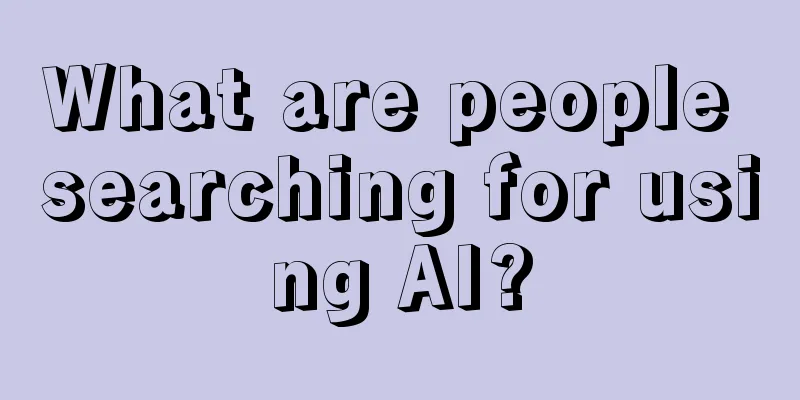What are people searching for using AI?

In mid-April, Wenxinyiyan announced that its user base had exceeded 200 million. When Robin Li made this data public, it had been a year and a month since Wenxinyiyan was launched. Based on Wenxinyiyan's large model capabilities, Baidu upgraded its search product "Simple Search" to AI interactive search in October last year. Screenshot from Simple Search official website Let’s go back two years. In November 2022, five days after ChatGPT was officially released, the number of users exceeded 1 million; within two months, the number of users reached 100 million. At that time, a report from UBS Group pointed out: In the past 20 years of Internet development history, no consumer-grade Internet application has grown users faster than ChatGPT . The release of ChatGPT was like a clarion call. Soon after, in December 2022, Perplexity AI was officially released; in February 2023, Google's chatbot Bard AI was launched, and one month later, the monthly visits exceeded 30 million times. Google believes that Bard AI can have 1 billion users in the future; in February 2023, Microsoft launched Bing Chat, and one month later, the total number of new and old daily active users of Bing exceeded 100 million. Whether at home or abroad, netizens flocked to AI search engines with an attitude of finding out more. Curiosity naturally drives huge traffic for new Internet products. The achievement of ChatGPT in overturning the history of Internet development alone can fully prove the impact that AI search engines have brought to the industry and global netizens. If we say that people concentrated on their first experience of AI search in the first half of last year, 90% of them were for curiosity. Then in January this year, Perplexity AI, an AI search startup that defines itself as the "next generation search product", announced that its monthly active users have steadily increased to 10 million , and Tiangong AI, an AI search product that is currently in the limelight in China, announced that its daily active users reached 340,000 on January 20. These are two signals worth paying attention to. This means that new search habits are being formed around the world, and a group of netizens have already turned their daily search behavior to AI . This great migration from traditional search to AI search still leaves many mysteries to the outside world:
1. What do people search for with AI?"What do people ask AI search engines every day?" Morketing asked the same question to different AI search engines. perplexity.ai lists 15 common questions from users: What are 20 ways to feel healthier? What is the average weight of an American woman? What is the average weight of an American man? How to pay off debt? Can you stop aging? How to lose weight quickly and safely? How to take a screenshot on a Mac? How to get super fit? How to properly replace a flat tire? What is the capital of Ukraine? How much does a human head weigh? What is the average height of an American male? When will the sun run out of nuclear fuel? What courses should I take if I want to become a doctor? 10 tips for celebrating a wedding anniversary? It says, "Users typically ask questions related to health, fitness, personal finance, technology, and common sense." Tiangong AI, the search engine owned by Kunlun Wanwei, did not give direct examples, but summarized six common problem categories: " news and information, academic and educational resources, shopping and product information, entertainment content, health and lifestyle, travel and transportation ." Looking at the current AI search engines, people's experience when using AI search is completely different depending on the type of question: When users want to obtain very basic information, such as website links, weather conditions, sports scores , etc., they often find that AI search is not as easy to use as traditional search engines. An author in the overseas technology field said, "AI likes to give me some additional information after thinking for a few seconds. I don't hate this additional information, but I hate that AI tools take so long to get what I need." When users want to know some hidden information, such as "how to take a screenshot on a computer" or "10 ways to stay healthy in spring ", the AI search capability is demonstrated. This is because the answers to these questions are relatively objective and there is sufficient information on the Internet. However, when searching on Google or Baidu, users need to do some self-selection work and may have to endure some advertising articles. AI can help humans complete the search + selection + integration work and directly provide useful information. In the third case, if the user asks a more "brain-opening" question that requires stronger independent thinking ability, AI search is also likely to answer some "correct nonsense" or directly say that it cannot answer the question in its logical mode. On the contrary, it is not as good as the information provided by traditional search engines based on keyword logic, which can more or less give people some associations and inspirations. In addition to asking questions directly, AI search engines can also provide users with some auxiliary functions. For example, 360AI search can provide users with intelligent questioning, intelligent translation, automatic generation of web page summaries, etc. Although mainstream AI search engines have not yet provided user usage behavior reports, judging from the comments of some domestic netizens, using AI to complete "writing assistance" tasks such as weekly work reports and papers is their main need for using AI search engines. The left is a traditional search engine; the right is an AI search engine Compared with the era of traditional search engines, users who have tried AI search engines have mixed reviews. Fans believe that, compared with the past when one would enter a question into the search box and get pages of cold "blue links," AI search is more conversational and presents refined and organized information. Skeptics say that when searching for relatively specific questions, AI answers may not be satisfactory, and it is better to directly use search engines such as "Baidu" to get a result set and then identify useful articles on your own. The point of disagreement lies in that although AI has powerful information crawling capabilities, people can't help but question whether AI's judgment ability is trustworthy . In summary, people's distrust of AI search mainly revolves around: first, whether AI can handle fake news and filter out false information well; second, whether an overly personalized search experience will limit the breadth of information users accept and make it impossible to "hear both sides to be wise"; third, for some biased and pedantic views on the Internet, AI may still copy and summarize them, amplifying the spread of such biased search results. 2. User search behavior will not become more uniform, but more diverseIn the past five years, when it comes to the "search war", professional search engines are no longer the only solution - Douyin and Xiaohongshu have gradually become platforms for people to retrieve information on a daily basis. Last year, Xiaohongshu released data showing that its average daily search volume was close to 300 million times; last year's Douyin Creator Conference also pointed out that the average daily search volume has increased by 300% in the past two years. This shows that as the content ecology of platforms such as Douyin, Xiaohongshu, and WeChat becomes deeper and deeper and user stickiness becomes stronger, the search functions of these "non-traditional search engines" are increasingly valued by netizens. Under the AI trend, "non-traditional search engines" are also catching up: in the second half of last year, Bilibili, Taobao, Xiaohongshu, Douyin, and Zhihu successively launched search functions based on AI technology. Admittedly, these AI search functions still have a long way to go before they are truly accepted by the public. At this stage, AI searches that are well known to the public are still concentrated on keyword-based search engines represented by Google, Bing, and Baidu. As AI helps traditional search giants to be renewed, users' search behavior is further firmly grasped by them. However, it is foreseeable that platforms such as Bilibili, Taobao, Xiaohongshu, Douyin, and Zhihu also have broad room for development, because the content ecosystem that is spontaneously "voted" based on user interests can naturally provide users with humanized and creative search results. In the long run, whether it is the presentation of search results that combines videos, pictures and texts, or the search advertising capabilities that serve sales and seeding, AI search on major mainstream Internet platforms may move forward in a diversified manner. In summary, AI has added technical possibilities to the search performance of major Internet platforms, but it has not put all platforms on the same starting line; on the contrary, as various Internet platforms rely on their unique content ecosystems to deeply deploy AI, the "search war" will not be limited to traditional search forms, and Internet users' AI search behaviors will become increasingly divided and diverse. 3. ConclusionFocusing on the action of "search" itself, foreign media mentioned in the article "How AI will reshape search engines in 2024" that there may be three significant development directions for AI search in the future: First, integration with AR technology to enhance the presentation of search results; second, predictive search, the search engine can calculate the next question of the questioner on its own, that is, to better understand the user's way of thinking and search behavior, thereby simplifying the user's search process; third, AI-driven content production, providing more content produced by AI. Looking at it in depth, AI will further change search engines in terms of search speed, accuracy, creativity, etc.; looking at it horizontally, AI technology will produce different chemical reactions when it collides with network platforms with different functions. Of course, some of the obvious limitations of the AI search function mentioned above still need to be addressed - so the search behavior of global users is changing, but there is still a long way to go before the final winner is determined. Author: Claire; Source: WeChat public account: Morketing (ID: Morketing) |
<<: Five new “authentic flavors”! How does Lay’s decode local culture?
>>: Al adds to the hype, triggering the "lying flat" tourism
Recommend
Super anchor's trust game
With the rise of the e-commerce industry, super an...
How is tradeindia? Is it expensive?
There are still many cross-border e-commerce platf...
When WeChat’s “Search” function learned to “Ask”
This article introduces the three major new change...
How to grow private domain activities like a "big company"
To achieve growth, you need not only a global pers...
Do I need to pay a deposit to open a store on Wish? What are the requirements for opening a store on Wish?
Today, I will introduce you to the content of open...
Does Amazon in the United States charge taxes? What taxes are there?
When you do anything, whether it is opening a stor...
Introduction to the free traffic channel activity for slow-selling products on Pinduoduo’s homepage
Pinduoduo products have been in the homepage pool ...
Save money or make money? Young people want everything in their "second-hand life"
As consumption concepts become increasingly divers...
The birth of marketing is to clean up the technological revolution
Nowadays, marketing is in full swing in the market...
How is it for a novice seller to enter Amazon? How much money can a novice seller usually make on Amazon?
For new sellers, they are often curious and confus...
"Aerobic" climbing - breaking through the siege with the new advertising short film
The old routines of advertising films are no longe...
For large companies, your competitive advantage lies in this...
This article mainly talks about how small and medi...
Decathlon, which turned against the brand, doesn’t want to be Lululemon
Decathlon has always been a low-price brand, but n...
Top 10 trends in marketing
Marketing is showing many innovative strategies, f...
Workers' copywriting, suitable for reading on weekdays
When working, you will always face various problem...









